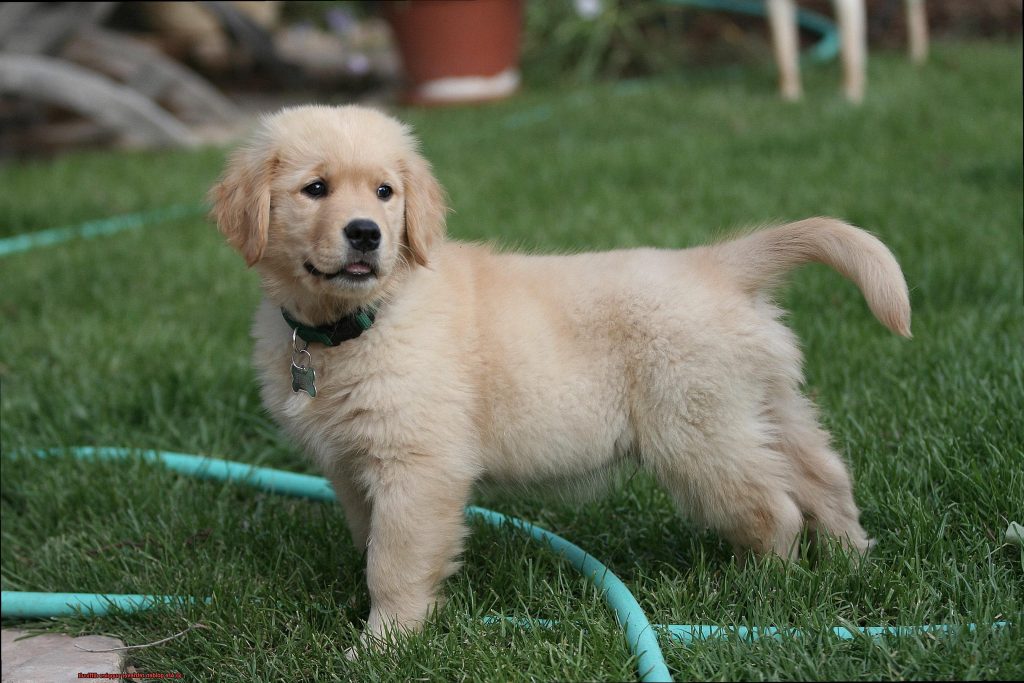Are you looking for a four-legged friend that will fill your home with love, loyalty, and endless cuddles? If so, the Golden Retriever breed may be just what you’re searching for. These furry companions are known for their friendly and gentle personalities, making them perfect for families and individuals alike. But as with any puppy, you may wonder if they come with their own set of challenges.
Golden Retriever puppies are highly intelligent and trainable, but they do require plenty of attention and effort from their owners. One of the biggest hurdles many owners face is managing their pup’s high energy levels, which can lead to mischievous behavior and restlessness. However, with proper socialization, training, and affection in a loving home environment, Golden Retriever puppies can thrive.
In this blog post, we’ll explore all aspects of raising a Golden Retriever puppy. From their temperament to grooming needs to training and socialization tips – we’ve got it covered. We’ll also provide valuable insights on how to handle common behavior issues that may arise during your pup’s development. Whether you’re a seasoned dog owner or a first-time puppy parent, our goal is to equip you with the knowledge and tools needed to create a happy and healthy life for your furry best friend.
So sit back, relax, and get ready to dive into the wonderful world of Golden Retriever puppies.
What Makes Golden Retriever Puppies Unique?
Contents
- 1 What Makes Golden Retriever Puppies Unique?
- 2 Are Golden Retriever Puppies Difficult To Handle?
- 3 Factors That Determine the Difficulty of Raising a Golden Retriever Puppy
- 4 Training Tips for Golden Retriever Puppies
- 5 Exercise Requirements for Golden Retrievers
- 6 Grooming Needs of Golden Retrievers
- 7 Conclusion
One of the key factors that make Golden Retriever puppies stand out is their gentle and friendly temperament. These social animals love nothing more than playing and interacting with their owners and other dogs. Their high level of intelligence also means they are quick learners, making them easy to train and eager to please.
But be prepared for their high energy level. Daily exercise, playtime, and mental stimulation are essential to keep these pups happy and healthy. And don’t forget about the importance of mental stimulation – puzzles, interactive toys, and obedience training can all provide valuable mental exercise for your furry friend.
While their thick coat of fur is one of their most endearing features, it also means that Golden Retriever puppies shed heavily twice a year. Regular grooming is crucial to keep their coat healthy and shiny. However, if you’re someone who doesn’t want to deal with constant shedding or has allergies, this may not be the breed for you.
Lastly, while Golden Retrievers are generally healthy dogs, they can be prone to certain health issues such as hip dysplasia, eye problems, and cancer. This is why it’s important for owners to be aware of these potential health issues and take steps to prevent or treat them.
Are Golden Retriever Puppies Difficult To Handle?
Golden Retriever puppies are one of the most beloved dog breeds in the world, and for good reason. Their friendly and outgoing nature makes them a great addition to any family. However, many people wonder if they are difficult to handle as puppies. As an expert on this topic, I can tell you that all puppies require a lot of time and attention, and Golden Retriever puppies are no exception.
One of the biggest challenges of owning a Golden Retriever puppy is their never-ending energy. These pups are always on the go, and need plenty of exercise and playtime to keep them healthy and happy. Without enough stimulation or exercise, they can become restless and destructive, which can be frustrating for owners.
In addition to their boundless energy, Golden Retriever puppies also have a tendency to chew on everything in sight. This is a natural behavior for puppies, but it can be frustrating for owners who have to constantly replace chewed-up shoes or furniture. To prevent destructive chewing, it’s important to provide your puppy with plenty of chew toys and supervise them closely.
House training is also a challenge for Golden Retriever puppies, as it is for all puppies. Patience and consistency are key when it comes to teaching your puppy where it is appropriate to go potty. Crate training can be a helpful tool in this process.
Despite these challenges, many owners find that Golden Retriever puppies are relatively easy to handle compared to other breeds. They are eager to please and respond well to positive reinforcement training techniques. With proper care and attention, they can grow into well-behaved and loving adult dogs.
Factors That Determine the Difficulty of Raising a Golden Retriever Puppy
Golden Retrievers are among the most affectionate and loyal dog breeds, but they require patience, consistency, and proper training to become well-behaved companions. As an expert on this topic, I’ve identified several factors that can determine the level of difficulty in raising a Golden Retriever puppy.

First and foremost, the age at which you acquire your puppy is critical. Puppies that are taken away from their mother and littermates too soon may struggle with socializing and adjusting properly. It’s best to wait until they’re at least 8 weeks old before bringing them home.
Another significant factor is your Golden Retriever’s temperament. Some puppies may be naturally laid-back and easygoing, while others may be more hyperactive and energetic. This can significantly impact the level of difficulty in training and socialization.
The amount and quality of training and socialization that your Golden Retriever receives also play a crucial role in their behavior. Proper training and socialization from an early age can make them easier to handle and less likely to develop behavior problems.
Finally, the environment in which your puppy is raised can affect their behavior as well. Puppies raised in a calm, stable environment are generally easier to train and socialize than those raised in a chaotic, stressful environment.
Training Tips for Golden Retriever Puppies
Golden Retriever puppies are some of the most adorable and intelligent creatures on the planet, but they can also be quite stubborn at times. That’s why it’s essential to train them from an early age. In this blog post, I’ll share five training tips that will help you raise a well-behaved and obedient Golden Retriever puppy.
Socialization
When it comes to training your Golden Retriever puppy, socialization is paramount. Exposing your puppy to different people, animals, and environments will help them become more confident and well-adjusted adults. A well-socialized Golden Retriever will be less likely to develop behavioral issues such as aggression or anxiety.
Positive Reinforcement
Positive reinforcement is a highly effective and humane training method for Golden Retrievers. This involves rewarding your puppy for good behavior with treats, praise, or playtime. Punishment or negative reinforcement should be avoided as it can cause fear and anxiety in your puppy.
Consistency
Consistency is crucial in training your Golden Retriever puppy. Everyone in the household should follow the same rules and use the same commands to prevent confusion and ensure that your puppy learns what is expected of them. This will also make training sessions more efficient.
Crate Training
Crate training is an essential aspect of training your Golden Retriever puppy. It involves teaching your puppy to view their crate as a safe and comfortable space where they can rest and relax. Crate training can also be helpful for potty training.
Ongoing Training
Training your Golden Retriever puppy is an ongoing process that requires patience, consistency, and positive reinforcement. Short and frequent training sessions throughout the day are more effective than one long session. Remember to always reinforce good behavior.
Exercise Requirements for Golden Retrievers
These furry friends are highly active and require plenty of exercise to maintain their health and happiness. As a new puppy owner, it’s essential to understand how much exercise your little one needs.
Golden Retriever puppies require at least 5 minutes of exercise per month of age, twice a day. For example, if your golden retriever is three months old, they should receive 15 minutes of exercise twice a day. However, it’s crucial not to over-exercise your puppy, as this can cause long-term health problems such as damage to developing joints and muscles.
While physical activity is important, mental stimulation is also vital for your puppy’s development. Golden Retrievers are intelligent dogs that love to learn and problem-solve. Incorporating mental exercises into their daily routine, such as puzzle toys or training sessions, can help prevent destructive behaviors like chewing or digging.
It’s worth noting that high-impact activities such as jumping or running on hard surfaces should be avoided until your puppy is at least one year old. This is because their joints and muscles are still developing and can be easily damaged.
Grooming Needs of Golden Retrievers
These cute and cuddly creatures are known for their stunning coats, which require regular grooming to maintain their beauty and health. As an expert on golden retrievers, let me guide you through their grooming needs.
Golden retriever puppies have a double-layered coat that sheds moderately throughout the year and heavily during spring and fall. To keep their coat healthy and clean, it’s crucial to brush them at least twice a week with a slicker brush or comb. Not only does this help remove loose hair, debris or dirt, but it also prevents matting and tangling of their hair, which can be painful for them.
Bathing your golden retriever puppy every 2-3 months with a mild dog shampoo is necessary to maintain their hygiene. However, over-bathing can cause dryness and irritation by stripping their coat of natural oils. So, make sure to dry them thoroughly after bathing to prevent any dampness that can lead to skin infections.
Trimming your golden retriever puppy’s nails regularly is another essential aspect of grooming. Long nails can cause discomfort and even lead to joint problems in the long run. You can use nail clippers or a grinder to trim their nails, but it is important not to cut into the quick, which is the sensitive part of their nail.
Lastly, dental hygiene care is critical for your golden retriever puppy’s overall health. Brushing their teeth at least 2-3 times a week with a dog toothbrush and toothpaste will help prevent any dental issues in the future.
Conclusion
In conclusion, Golden Retriever puppies are a delightful addition to any family, but they do require some effort and attention from their owners. These furry companions are renowned for their friendly and amiable personalities, making them ideal for households of all kinds. However, managing their boundless energy levels can be challenging at times. To keep these pups happy and healthy, daily exercise, playtime, and mental stimulation are crucial.
Golden Retriever puppies also need proper socialization, training, and affection in a nurturing home environment to thrive. They possess unique characteristics that set them apart from other breeds such as their gentle nature, high intelligence quotient, thick coat of fur that sheds heavily twice a year, and potential health issues.
To raise a well-behaved and obedient Golden Retriever puppy requires patience and consistency with positive reinforcement training techniques. Crate training is also an essential component of potty training or teaching your puppy to view their crate as a safe space where they can rest and relax. Short but frequent training sessions throughout the day using the same commands will make the process more efficient.
Furthermore, Golden Retrievers require plenty of exercise to maintain their physical health and happiness. Mental stimulation is also vital for your puppy’s development. Incorporating mental exercises into their daily routine can help prevent destructive behaviors like chewing or digging.
Lastly, grooming needs of Golden Retrievers include regular brushing with a slicker brush or comb at least twice a week to prevent matting or tangling of hair which can be painful for them. Bathing every 2-3 months with mild dog shampoo is necessary to maintain hygiene while over-bathing can cause dryness and irritation by stripping natural oils. Trimming nails regularly using nail clippers or grinder is important not to cut into the quick which is the sensitive part of their nail while dental hygiene care is critical using dog toothbrushes and toothpaste at least 2-3 times per week to prevent future dental issues.
So, Golden Retriever puppies are not necessarily difficult, but they do require some effort and attention from their owners.









